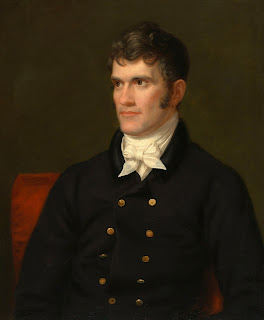The Election Of 1824: William Crawford vs. John Quincy Adams vs. Henry Clay vs. Andrew Jackson
Intro: Hello and welcome back to another presidential election article as I'll be talking about the election of 1824, an election that's got one of the dustiest finishes in U.S. history and it will signal the end of one-party rule in America.... So, with all that said let's get into it.
The End of an Era
So, James Monroe decides to follow in the footsteps of his predecessors and not seek a third term as president after holding the office of commander and chief for the last eight years; Monroe's presidency basically saw the former Secretary of State and founding father attempting to maintain a level of political unity and harmony within the country and he was quite successful as evidence by his unopposed victory in 1820.
The Federalist Party is no more by the election 1824 as the Hartford Convention among other factors has led to the party's demise and so we have the Democratic Republican Party as the only political party within the United States at this time in which "The Era of Good Feelings" was swiping throughout the country.
Despite Monroe's best effort's, not everything is smooth sailing for the U.S. as the country experienced its first economic crisis with the Panic of 1819 which lasts until 1821 and you also have 'The Missouri Compromise' which was used to balance the number of free states and slave states in the U.S. whilst establishing a line to make it clear which states can have slavery and which ones didn't.
By the time Monroe decides not to run again, the Democratic Republicans are divided over the issues of sectionalism, tariffs and infrastructure, so discussions over who will be the next one to take James Monroe's place start up long before 1824 but one person no expects to make a run for it is Monroe's Vice President, Daniel D. Tompkins who was suffering from poor health due to his alcoholism and his financial situation wasn't looking to good either, in fact Tompkins would end up dying just three and a half months after leaving the White House.
With Tompkins in no shape (physically or politically) to run and Monroe being the last founding father to become president, the field was left wide open for a number of people to run, so let's take a look at the candidates.
The Presidential Candidates
The top four candidates running in this election for the Democratic Republicans are William Crawford, Henry Clay, John Quincy Adams and General Andrew Jackson.William H. Crawford was James Monroe's Secretary of the Treasury from Georgia and someone who almost got the nomination for the party in the election of 1816 but now with Monroe out of the picture, Crawford believes he can get the nomination which he does by way of the party's congressional caucus.
Henry Clay, who was the Speaker of the House from Kentucky refused to run in the election of 1816 but much like Crawford, Clay is looking to try his hand at winning the presidency; Clay like many other Democratic Republicans were not pleased with Crawford winning the nomination via the congressional caucus as they viewed it as undemocratic which explains why other candidates ran in this election despite Crawford being the nominee.
John Quincy Adams is the son of former vice president turned second president, John Adams and the current Secretary of State from Massachusetts; Adams much like his father believed in similar ideals that were more aligned with the Federalist Party but by the time James Madison and James Monroe's terms as president came to an end, much of the Democratic Republicans have adapted some of those Federalist ideas.
Finally, we come to Andrew Jackson who was a former Governor and Senator from Tennessee and the military general who led the U.S. to victory in the Battle of New Orleans and took part in the First Seminole War between the Seminole Indian tribes that lived in Florida.
So, with the four main candidates discussed and the newly elected vice president taken care of, let's go straight to the results.
Aside from a few arguments on the domestic and foreign ideas, all four candidates agreed with each other on most issues, so the campaigning wasn't too intense but the supporters for all four politicians did used newspapers and political cartoons and campaign songs to promote their respective candidate.
Now as you can see from the electoral map it's certainly a very sectional election as John Quincy Adams gets 84 electoral votes in places located in the Northeast like New England, Vermont, Connecticut and New York while also receiving 30.9% of the popular vote.
William Crawford got 41 electoral votes from places like Georgia and Virginia, but he came in fourth place in the popular vote with 11.2%. This might have something to do with the fact that Crawford had suffered a stroke during the election, so most Americans probably didn't think it was a good idea to vote for someone with health problems for president.
Henry Clay came in fourth place for in the electoral vote, receiving 37 votes from places like Missouri, Ohio and his home state of Kentucky, but came in third place with the popular vote getting only 13%.
Andrew Jackson's support was more diverse as he was able to get states like Pennsylvania, New Jersey and southern states like Alabama, North and South Carolina and Mississippi. This resulted in Jackson receiving 99 electoral votes and 41.4% of the popular vote.
Now, you'd think since Jackson has the most electoral and popular votes in this election, he would be the new president but that's not the case as you needed 131 electoral votes to win the election in 1824, so now it's up to the House of Representatives to decide who will be the new president thanks to the 12th Amendment in the Constitution.
The Corrupt Bargain
So, the House of Representatives need to decide on who will be the next president of the United States by way of the 12th Amendment but only the top three candidates in the electoral vote can take part in this matter, so unfortunately for Henry Clay his out of the running.That said, Henry Clay isn't finished yet as he now has the unique position as Speaker of the House to make the final decision on who will become the new president; Now you'd think he would simply make Andrew Jackson the winner as he had the most electoral and popular votes, but that's not going to happen as Clay despised Andrew Jackson on his military actions in the War of 1812 among other matters.
This, combined with Crawford suffering from the stroke and Clay agreeing with John Quincy Adams on many ideas led to a decision that will change American politics forever.
After the House of Representatives delivered their verdict, it was announced that John Quincy Adams was now the 6th president of the United States.
Many including Jackson himself believed a deal was made between John Quincy Adams and Henry Clay with the belief that if Clay made Adams the new president, Clay would become the new Secretary of State as Jefferson, Madison, Monroe and now Quincy Adams all held that position and then became the new commander and chief.
Neither Clay nor Quincy Adams confirmed these rumors to be true, but many found it suspicious that not too long after Adams became the president, Henry Clay was named the new Secretary of State.
This election is special for multiple reasons:
- It's the first and only election to see the person with the most electoral votes not become the president.
- It's the first of many times the candidate who won the popular vote did not become president.
- It's the first of two times the son of a former president became president
- This was the seventh and final election win for the Democratic Republican party, a winning streak that has yet to be broken.
As you can imagine, Andrew Jackson like many people in the country were pissed over what they believed to a "Corrupt Bargain" between Clay and Adams, but Jackson certainly isn't going away after this as the results of this election that will lead to 'Old Hickory' coming back in four years as well as the rise of one of the most influential political parties in U.S. history.
The Election Of 1820: James Monroe vs. James Monroe
So that's the election of 1824, one of the most controversial finishes in an election since 1800 and the seeds for a very nasty rematch has been sown for 1828.
Be sure to leave your thoughts below and follow me on Twitter @FullertonHakeem...peace.










Comments
Post a Comment